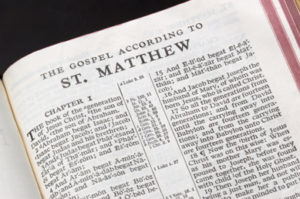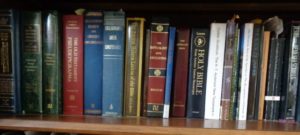 Oftentimes people meld the accounts in Matthew 1 and Luke 1 to form the basis for the Virgin Birth Doctrine.
Oftentimes people meld the accounts in Matthew 1 and Luke 1 to form the basis for the Virgin Birth Doctrine.
However, these accounts are speaking of two different episodes in time.
While the book of Matthew appears first in the Bible, the account given in Luke 1, which addresses a time before Mary conceives, precedes the account given in Matthew 1, which speaks of a time after Mary has conceived.
The Natural Origin
Matthew opens his book addressing the natural origin of the Messiah Yeshua, being the son of Abraham, by way of King David, through his father Joseph.
Then, the author gives an account of the visitation of the angel to Joseph, which takes place after Mary has conceived, but before she gives birth.
Although the Virgin Birth Debate tends to hone in on the idea that Mary “was found to be with child of the Holy Spirit” and that Joseph intended to send her away, I believe the first chapter of Matthew is telling a greater story.
Promises Made, Promises Kept
Promises were made by God to Abraham and David concerning their physical seed, and although David’s throne became vacant during the carrying away to Babylon, the birth of the Messiah Yeshua in the days of Joseph and Mary brought hope back to the children of Israel.
The author not only makes a case drawing attention to the genetic line of Jesus, but also to the sign given to the house of David in Isaiah’s day, declaring “God is with us”. Sadly, most misunderstand the reference to Isaiah’s words as being prophetic of a Virgin Birth, however I understand it to be a connection of hope.
The Hope For Salvation
When it appeared that all hope was lost at the carrying away to Babylon and the last king reigned on David’s throne, the prophets spoke of a righteous branch of David to come, one who would save his people.
Behold, the days come, saith the LORD, that I will raise unto David a righteous Branch, and a King shall reign and prosper, and shall execute judgment and justice in the earth. In his days Judah shall be saved, and Israel shall dwell safely: and this is his name whereby he shall be called, THE LORD OUR RIGHTEOUSNESS. (Jer 23:5-6 KJV)
Then in Matthew we see the angel of the Lord announce to Joseph that the child his wife is carrying is the one who will bring salvation to his people.
[T]he angel of the Lord appeared unto him in a dream, saying, Joseph, thou son of David, fear not to take unto thee Mary thy wife: for that which is conceived in her is of holy spirit. And she shall bring forth a son, and thou shalt call his name [YEHOSHUA]: for he shall save his people from their sins. (Mat 1:20-21)
This is what I’ve found, but have you ever studied this matter out for yourself?
I’ve put together a Bible Study Guide entitled “The Birth of Jesus Christ” to assist in studying this subject for yourself.
Also, I’m hosting a remote Bible Study class on Thursday nights in the months of May and June in 2017 for the purpose of learning and sharing our studies on this particular matter together in a round-table discussion format.
I can tell you what all I believe, but I prefer that you study it for yourself, and then if you like, we can compare notes.
Get a copy of the The Birth of Jesus Christ Bible Study Guide (available soon!).


Shalom Carrie! Thanks for your rendering of the origins of Yahshua. You offer logical and well researched material. What confused me a bit in this article though, is your reconfigured sentence: was “…begotten of her of spirit.” My immediate understanding of what that implies is that the “begotten of her OF spirit” (emphasis on “OF”), is saying: the begotten is OF spirit, which is what your argument seems to deny, if I am understanding correctly. Can the human (seed from man and egg from woman) form be begotten of spirit? How is that reckoned? I hope I didn’t confuse you. Thanks, Ann
Hi Ann! 🙂 My position is that the flesh of Jesus/Yeshua was not begotten of spirit, but rather it was begotten of flesh. However, his spirit was begotten of spirit, and that spirit was holy. This understanding is based on what Yeshua said in John 3:5-8 to Nicodemus.
“Jesus answered, Verily, verily, I say unto thee, Except a man be born of water and of Spirit, he cannot enter into the kingdom of God. That which is born of the flesh is flesh; and **that which is born of the Spirit is spirit**. Marvel not that I said unto thee, Ye must be born again. The wind bloweth where it listeth, and thou hearest the sound thereof, but canst not tell whence it cometh, and whither it goeth: so is every one that is **born of the Spirit**.”